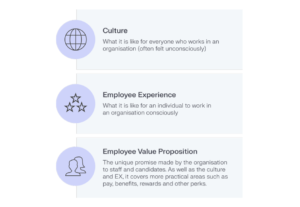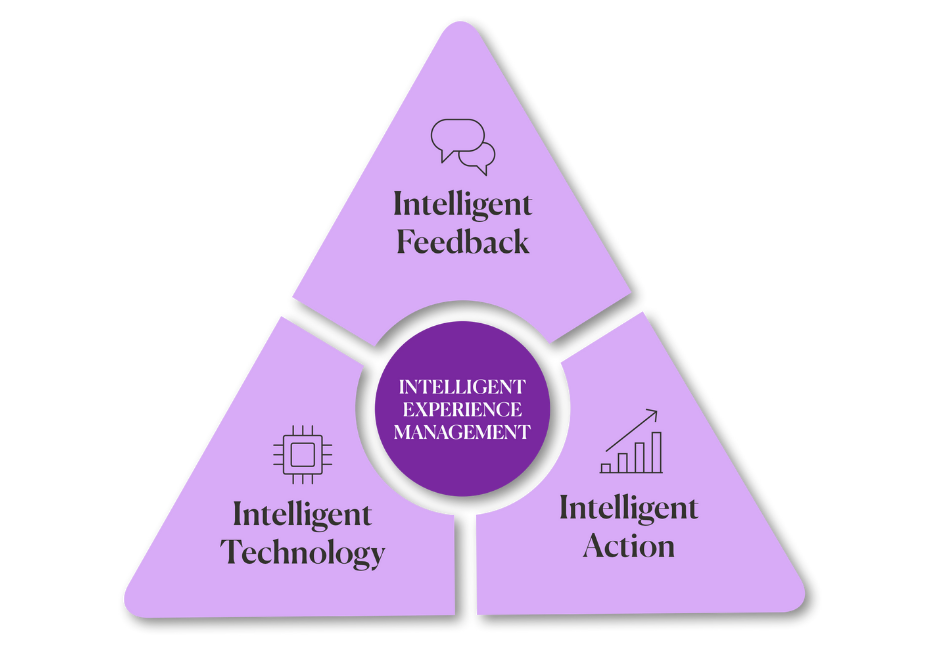Written by Kate Pritchard
Organizations understand the importance of the employee experience to retain and get the best from their people. In fact, 92% say it is a priority for 2021 . They also know that the employee value proposition (EVP) that they offer to candidates and staff is crucial to attracting the right talent. What can be less well understood is how culture impacts the employee experience (EX) and the EVP and how they fit together.
To start it is important to define what each of these terms cover: culture, employee experience, employee value proposition.

The three areas are clearly intrinsically linked. For example, take a closed culture where promotion is based solely on length of service, rather than skills or performance. This will translate into a poor employee experience for staff looking to progress rapidly in their careers, no matter how positive other working conditions are. Equally the EVP will not be attractive to ambitious candidates, meaning the business misses out on their talents and skills. Ultimately this hits the bottom line and impacts areas such as customer satisfaction and the customer experience.
Increasingly employees (particularly millennials/Gen Z) are attracted to companies with a strong, clear mission. This needs to be reflected in the culture if you want them to stay and thrive. It therefore must be part of your Employee Value Proposition when attracting staff.
Given the importance of employee experience to business today, it is vital that your culture supports a positive EX. This not only improves your people’s performance but is reflected in happier customers, greater revenues and higher loyalty. Achieving this requires a focus on four main areas:
1. Understand your culture
Start by understanding your current workplace culture and how you want it to evolve. For example, it will be difficult to build a positive employee experience if you operate a blame-based culture where people and teams are punished for their mistakes. In this organization employees will be less likely to take risks or ask questions for fear of potential negative consequences – even if they have a great, supportive manager.
If instead you have an open, transparent culture where ‘mistakes’ are seen as learning opportunities, then the employee experience for individuals is likely to be much more positive. This high performance culture will ensure employees feel valued and motivated. As the world of work changes post-pandemic, culture will need to evolve to support the employee experience that staff are looking for.
2. Focus on the moments that matter
Delivering the right EX to every member of staff can appear daunting in a hybrid working world. Managers may not see their team members on a day-to-day basis. The work environment and experience will potentially be very different for each individual employee. That makes it vital for EX to focus on the moments that matter for each member of staff.
Taking lessons from the customer journey, Gartner outlines five components of these moments that matter:
They generate emotion in employees (either positive or negative)
They are scalable, affecting a large number or percentage of the workforce
They occur most frequently in the employee experience, meaning they are likely to have happened recently to people
They are aligned with business strategy, culture and values
They disproportionately affect the most critical employees in your organization
A culture needs to be in place that recognizes and celebrates these milestones. These could include the first day at work, passing a probationary period, completing a major project, or personal events such as marriage or the birth of a child.
HR teams can support managers in tracking these events. However, for the employee experience to be genuine the right behaviors have to be rooted in culture. For example, rather than a manager sending a scripted email welcoming a new recruit, they should go the extra mile and spend personal time learning and getting to know them as an individual. That can only come from culture. It has to be “how we do things around here”, rather than a chore imposed by HR.
3. Listen and act on feedback
Understanding how satisfied staff are with the employee experience requires continuous listening. HR leaders then need to act on this feedback to improve employee engagement. The same approach can also help measure alignment between staff and culture. It can demonstrate any gaps between your values and day-to-day behavior and again demonstrate where improvements can be made.
Employee feedback is key to building the right experience and culture across your organization. This is particularly important in a hybrid working world, where culture is potentially in flux. At the same time individual working experiences may be changing dramatically, as people move back to the office, on a full or part-time basis. A listening culture translates into a great employee experience, helping everyone feel involved and valued.
However, you need to measure culture and employee engagement differently:
Employee engagement surveys focus on conscious factors (attitudes and beliefs)
Culture surveys have to measure unconscious factors (behaviors and assumptions).
That requires different surveys, carried out separately. Equally, it is vital not to overcomplicate culture surveys. Rather than deploying complex psychometric tests with multiple dimensions that are difficult to analyze or act upon, focus on behaviors. We’ll provide more hints on how to do this in the final blog.
4. Be intentional in communications
In a hybrid world, both the EX and culture can suffer if face-to-face contact is not replaced with clear, intentional communications. The risk is that if managers make assumptions rather than positively reinforcing culture, behaviors will change in the wrong ways. Inadvertently saying the wrong thing – or saying nothing at all – can erode culture and the EX.
Therefore, organizations need to focus on communication, particularly around culture. Business leaders must explain what has changed, what is changing and how they are listening to concerns. They need to be proactive, particularly when teams are not physically in the same building, at the same time.

Tivian’s vision of Intelligent Experience Management brings together intelligent technology and a clear strategy for collecting feedback to deliver actionable insights that enable managers and teams to drive ongoing improvements.

